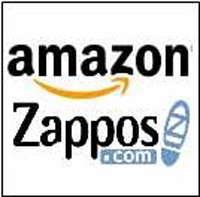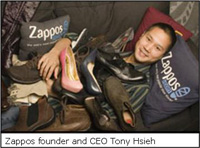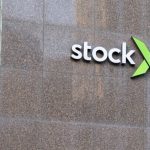That was how Zappos.com founder and CEO Tony Hsieh described on his blog the relationship between the two companies after Amazon, Inc. — the Wal-Mart of e-commerce — reached an agreement to acquire Zappos.com, the wildly-successful online shoe merchant, for $847 million, largely in stock.
 While the deal falls short of what many expected would have been a transaction done at least at a valuation of 1x revenues, there is speculation that assumption of debt may close that gap.
While the deal falls short of what many expected would have been a transaction done at least at a valuation of 1x revenues, there is speculation that assumption of debt may close that gap. The Zappos management team, including Hsieh, are staying on and Zappos will remain a separate entity headquartered in Henderson, NV. The deal provides Zappos employees with $40 million in cash and restricted stock units.
Observers see the purchase as Amazon's most serious effort to tap into footwear and apparel — the largest online category and areas in which Amazon has had limited success. In 1997, it launched the footwear and handbags website called Endless.com, though the site hasn't taken off. Reluctance by many vendors to supply Amazon with key footwear brands has been an issue. Zappos has had an uphill battle in that area as well, but finally added Nike to its stable of offerings just a couple of years ago and is now seen as THE online retailer of choice for most brands.
Zappos, backed by venture capital firms including Sequoia Capital, had just over $1 billion in sales in 2008. Amazon's sales reached $22.4 billion last year.

According to published reports, Sequoia told investors it will get just over $169 million from the Amazon transaction. Sequoia put $20 million into Zappos in 2004 and invested another $15 million in 2005, but other reports have their total investment pegged at roughly $48 million.
Financial analysts that spoke with Sports Executive Weekly suggested that Zappos could have fetched 2x to 3x revenues had it gone public in a better environment — or if had been able to turn a profit. The online retailer focused on top-line growth and service, a strategy not unlike the early days of Amazon.com.
“Zappos is a customer-focused company,” said Amazon CEO Jeff Bezos. “We see great opportunities for both companies to learn from each other and create even better experiences for our customers.”
Founded in 1999, Zappos.com made a name for itself by offering free shipping and free 365-day returns, as well as its fanatical devotion to customer service and employee training. Reps are even encouraged to recommend competitors' websites when Zappos doesn't have what shoppers are looking for. Although some believe the deal only happened because of a dead IPO market, Zappos is expected to significantly benefit from Amazon's technological prowess and reach.
In a letter to employees, Hsieh said merging with Amazon will enable the company to “really accelerate the growth of the Zappos brand and culture, and we believe that Amazon is the best partner to help us get there faster.” He further said Amazon supports the Zappos vision to grow “as an independent entity,” and is a partner “that thinks really long term (like we do at Zappos), as well as do whats in the best interest of our existing shareholders and investors.”
But he stressed that Zappos' culture wont be changing.
“A big part of the reason why Amazon is interested in us is because they recognize the value of our culture, our people and our brand,” wrote Hsieh. “Their desire is for us to continue to grow and develop our culture (and perhaps even a little bit of our culture may rub off on them),” said Hsieh. “They are not looking to have their folks come in and run Zappos unless we ask them to. That being said, they have a lot of experience and expertise in a lot of areas, so we're very excited about the opportunities to tap into their knowledge, expertise, and resources, especially on the technology side. This is about making the Zappos brand, culture, and business even stronger than it is today.”
Amazon shares were up 16.5% over the 45-day period — starting in mid-May — over which the average stock price was established, and hit a 52-week high in trading on Thursday. Shares were basically flat for the week after the company reported disappointing second quarter results.
Morgan Stanley advised Zappos and Lazard Ltd. advised Amazon on the deal.















